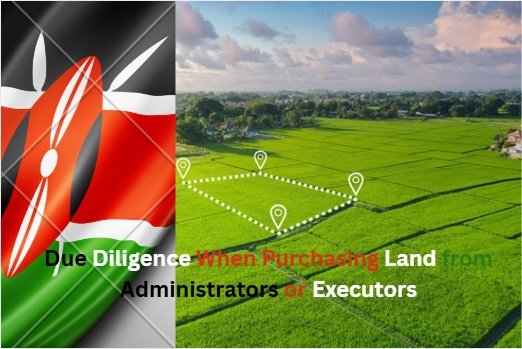
BUYER BEWARE!! DUE DILIGENCE WHEN PURCHASING LAND FROM ADMINISTRATORS OR EXECUTORS
Review of the Court of Appeal decision in Musa -V- Musa & 6 Others (Civil Appeal 264 Of 2019) [2025]
The Appellant, Eric Sydney Musa, contested the High Court’s decision in a succession dispute concerning the estate of the late Musa Omurwa. The estate included several properties, notably land parcels in Kisii County. The first Respondent, Mary Kemunto Musa, along with 6 other Respondents, was involved in the administration and distribution of the estate. A significant point of contention was the transfer and registration of certain properties, which the Appellant claimed were done without proper consent and in violation of succession laws. Eric Sydney Musa filed the appeal after the High Court had found that Mary Kemunto Musa, the Administrator of the deceased’s estate, had improperly renewed a land lease in her own name and sold the property. The Appellant (Eric Sydney Musa) argued that the subsequent transactions, including the sale to Ibrahim Onkoba Makaya &Pamela Adhiambo Ouko (the 2nd and 3rd Respondents) and a charge to Family Bank Limited (the 4th Respondent) were illegal and should be cancelled.
The Eric Sydney Musa (the Appellant) claimed that the 1st respondent, Mary Kemunto Musa, fraudulently transferred the suit property to herself without a confirmed grant of letters of administration. Mary Kemunto Musa had only obtained a limited grant in 2010, which she used to extend the lease and transfer the property to herself as the sole beneficiary. She later sold the land to her brother Ibrahim Onkoba Makaya (the 2nd Respondent), who used it to secure a Kshs. 20 million loan from Family Bank. However, the High Court determined that Ibrahim Onkoba Makaya & Pamela Adhiambo Ouko (the 2nd and 3rd Respondents) were innocent purchasers for value. The High Court also found the bank (Family Bank Limited) to be an innocent third party that had conducted due diligence before granting a loan. Consequently, the High Court ordered Mary Kemunto Musa to compensate the deceased’s estate with the proceeds from the sale, but it protected the interests of the 2nd and 3rd Respondents and Family Bank, who were unaware of the underlying disputes. In the Appeal, the Appellant was now challenging this decision, seeking to nullify the entire transactions and have the property returned to the deceased’s estate.
The issues for determination were:
- Whether the suit property formed part of the deceased’s property?
- Whether the 2nd and 3rd Respondents qualified as innocent purchasers for value without notice?
The Appellant (Eric Sydney Musa) alleged that Mary Kemunto Musa the 1st Respondent fraudulently transferred the suit property to herself without first obtaining a confirmed grant of letters of administration. The Appellant’s argument was that the sale of the deceased’s property was illegal because it constituted “intermeddling” as per Section 45 of the Law of Succession Act. The Administrator, MaryKemunto Musa, did not have the legal capacity to sell the property since the letters of administration had not yet been confirmed, a requirement under Section 79 and 82 of the same Act. The Appellant emphasized that since the initial transaction by Mary Kemunto Musa was illegal, the subsequent purchasers (the 2nd and 3rd Respondents) could not have acquired a valid title, as one cannot acquire what the seller did not legally own.
The trial judge acknowledged MaryKemunto Musa’s illegal and unprocedural actions. She was aware of her duties as an Administrator and had even listed the property as an asset of the deceased’s estate when applying for the grant. The judge noted that Mary’s actions were a clear attempt to take the estate’s property for her own benefit. However, the appellant faults the trial judge for not taking the next logical step: cancelling the illegal title and nullifying the sale to the subsequent purchasers, instead of just ordering Mary Kemunto Musa to compensate the estate.
On whether Ibrahim Onkoba Makaya & Pamela Adhiambo Ouko (the 2nd and 3rd Respondents) qualified as innocent purchasers for value without notice, the court held that the 2nd and 3rd Respondents were NOT innocent purchasers for value without notice. The trial judge had found that they were “skeptical” of their claim of ignorance but absolved them of liability. However, the subsequent analysis argues that this finding was erroneous because the purchasers failed to meet the legal standard of due diligence.
The Court of Appeal cited the case of Supreme Court of Uganda in Lwanga vs. Mubiru and Others (Civil Appeal 18 of 2022) [2024] UGSC 7 and Dina Management Limited vs. County Government of Mombasa. It stated that being a bona fide purchaser requires not just an official title search, but a thorough inquiry into the “root of the title” and the history of ownership. The 2nd and 3rd Respondents failed to conduct this level of investigation. Had they done so, they would have discovered that their seller’s title was unlawfully obtained from a deceased person’s estate before the grant of administration was confirmed.
Therefore, since the seller (MaryKemunto Musa) had an invalid title, and the purchasers failed to exercise the required due diligence, the legal defense of being an “innocent purchaser for value without notice” was not available to them. They could not have acquired a valid title and should not have been absolved of liability.
The Court of Appeal thus found the appeal as merited and allowed it, ordered that the suit property revert to the deceased’s estate for proper distribution under succession law and all land registry entries showing the Respondents’ ownership or charges in favor of Family Bank cancelled. The Appellant was also awarded the costs of the suit.
At A.O. WANGA ADVOCATES we are happy to assist you with due diligence and legal representation when purchasing property in Kenya.
For more information contact us via info@aowangaadvocates.com or +254794600191
All rights reserved for A.O. WANGA ADVOCATES
www.aowangaadvocates.com






Leave a Reply